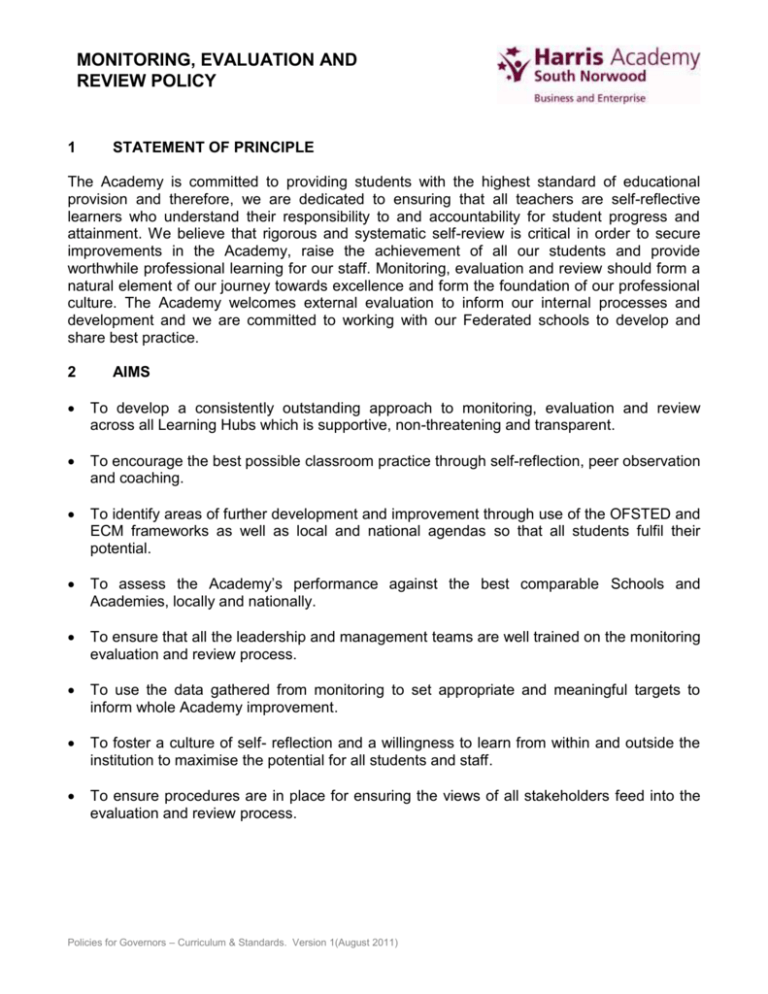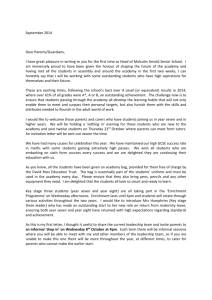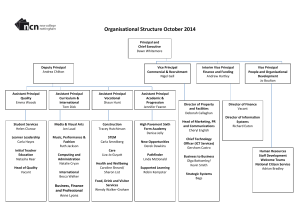Curriculum Policy - Harris Academy South Norwood
advertisement

MONITORING, EVALUATION AND REVIEW POLICY 1 STATEMENT OF PRINCIPLE The Academy is committed to providing students with the highest standard of educational provision and therefore, we are dedicated to ensuring that all teachers are self-reflective learners who understand their responsibility to and accountability for student progress and attainment. We believe that rigorous and systematic self-review is critical in order to secure improvements in the Academy, raise the achievement of all our students and provide worthwhile professional learning for our staff. Monitoring, evaluation and review should form a natural element of our journey towards excellence and form the foundation of our professional culture. The Academy welcomes external evaluation to inform our internal processes and development and we are committed to working with our Federated schools to develop and share best practice. 2 AIMS To develop a consistently outstanding approach to monitoring, evaluation and review across all Learning Hubs which is supportive, non-threatening and transparent. To encourage the best possible classroom practice through self-reflection, peer observation and coaching. To identify areas of further development and improvement through use of the OFSTED and ECM frameworks as well as local and national agendas so that all students fulfil their potential. To assess the Academy’s performance against the best comparable Schools and Academies, locally and nationally. To ensure that all the leadership and management teams are well trained on the monitoring evaluation and review process. To use the data gathered from monitoring to set appropriate and meaningful targets to inform whole Academy improvement. To foster a culture of self- reflection and a willingness to learn from within and outside the institution to maximise the potential for all students and staff. To ensure procedures are in place for ensuring the views of all stakeholders feed into the evaluation and review process. Policies for Governors – Curriculum & Standards. Version 1(August 2011) OBJECTIVES 3.1 Students 3.2 For Teachers and Support Staff 3.3 To reflect on professional practice at all times, engaging in the monitoring, evaluation and review processes positively in order to improve performance and raise achievement of all students. To be responsible for monitoring the academic progress and behaviours of all students in their classes, following classroom and lesson expectations, marking, reporting, sanctions and rewards processes consistently and accurately. To take responsibility for own professional development through self evaluation and to participate in peer observations as appropriate. For Coordinators 3.4 To adopt a responsible approach to their learning and progress, self-monitoring both their own academic achievements and behaviour. To recognise that in order to improve and develop their learning further, self evaluation within and beyond the classroom is crucial. To be able to respond to staff feedback in a mature and focused manner. To take part constructively and responsibly in evaluation and improvement plans of Academy activities (including teaching and lessons). To monitor, evaluate and review the quality of teaching and learning across the Learning Hub, in line with the Academy policy. To provide an annual monitoring timetable, communicated with staff, identifying areas for half termly focus. To provide examples of excellence in teaching and learning strategies to role model best practice to his/her team. To be committed to raising achievement and attainment through rigorous and systematic use of monitoring, evaluation and review. To co-construct with his/ her team an Action Plan which supports the aims, ethos and direction of the Academy Improvement Plan. To review progress against targets half termly, agreeing intervention with Assistant Principal where appropriate. To raise causes for concern regarding student progress and staff performance through line management meetings as appropriate. For the Academy Leadership Group To ensure that, alongside the Coordinators, monitoring, evaluation and review has a positive impact on the quality of teaching, learning and ECM provision in relevant learning hubs. To provide lesson observation training and moderation to all Coordinators to ensure consistency of judgement is achieved. 2 3.5 For the Governors 4 To provide support and expertise in each Internal Review. To ensure the procedures for self-evaluation and review are consistent across the Academy and effective in raising achievement through sustained and continuous improvement of teaching and learning. To use information and observations from Internal Reviews to inform the SEF and Academy Improvement Plan. To review the academic targets set in the Academy Improvement Plan (KS3, GCSE/BTEC, AS/A Level). To review data on attendance, exclusions, free school meals etc. To review reports through sub-committees on individual subject progress. To review progress on the Academy Improvement plan through the Principal’s Termly Reports to the full governing body. THE ACADEMY SELF-EVALUATION CYCLE Start Review progress of action Establish the focus (national/local comparison) Student Achievement Determine what evidence is to be collected and by what method Teaching and Learning Expertise Take action for improvement Plan for improvement Analyse the evidence and make judgments 3 In order to establish sustainable Academy improvement, all stakeholders are required to contribute to the cycle of monitoring, self-review and evaluation. The focus of improvement will always be grounded in student performance and achievement with success identified through comparison of current performance to local and national benchmarks. The cycle illustrates a model which can be implemented at Academy, Learning Hub and Subject level to inform efficient and effective planning, intervention and analysis of improvement strategies. 4.2 External Evaluation (a) OFSTED In order to fulfil the requirements of the OFSTED framework, the emphasis on selfevaluation is crucial. This document is informed by the SEF (Self Evaluation Form) and provides the basis on which whole Academy judgements on performance will be made. (b) The Federation The Principal will evaluate the overall effectiveness of the Academy with the CEO . THE ACADEMY IMPROVEMENT PLAN (AIP) 5 5.1 The Academy Improvement Plan outlines the crucial areas of focus for accelerating the Academy’s progress towards internal and external targets. The key indicators and methodology by which improvement can be gauged are included, following best practice which will then be disseminated to inform Learning Hub Improvement Plans. (LHIP) Each Learning Hub and Subject area will construct an Improvement Plan, based on the targets outlined in the Academy Improvement Plan. In addition, each Subject Area will produce a detailed Raising Achievement Plan which will illustrate how intervention methods to maximise student potential will be implemented and monitored. 5.2 The Academy Improvement Plan is monitored throughout the year by: The Principal, Vice Principals and Assistant Principals who will review and provide evidence of progress against AIP targets on a half termly basis The Academy Leadership Group monitor progress of Learning Hub Improvement Plans through line management meetings and Internal Reviews Governors, through Principal and Vice Principals’ reports, at full Governors’ and committee meetings The Principal and ALG along with the whole staff evaluate overall success of the AIP at the end of the Spring Term, which will also inform the improvement plans for the next academic year. 4 6. MONITORING, EVALUATION AND REVIEW THROUGH INTERNAL REVIEW BY THE ACADEMY LEADERSHIP Group 6.1 Structure of Internal Review: Each Subject area will undergo an Internal Review led by the relevant Assistant Principal with full involvement from the ALG. A full Internal Review will take place every 2 years, with a ‘light touch’ review’ during the interim year. In addition to this, internal monitoring procedures will be scheduled throughout each term, coordinated by Coordinators and Subject Coordinators as appropriate. The Internal Review will consist of 5 stages: 1. Assistant Principal meets with the Vice Principal to discuss process. 2. Assistant Principal meets with the Vice Principal and captures the SEF for subject area. Analysis of the Subject area SEF will be used to identify areas of strength and those requiring improvement. This will guide the internal review process. 3. Coordinator meets with the Assistant Principal and Vice Principal to analyse achievement data and identify strengths and areas for improvement e.g. progress of gifted and talented, EAL etc. This should enable secure judgements to be made on attainment and progress. 4. The Vice Principal of the Learning Hub will work with the Assistant Principal to devise a programme of lesson observations during the Internal Review period. This will include Student Commissioners conducting joint observations with a member of ALG. 5. If necessary, subject experts may be used to support the review process, particularly where subject expertise would be valuable. 6. A range of monitoring and evaluation activities will be planned, reflecting those used during half termly monitoring by Coordinators. Procedures will include: analysis of student progress work scrutiny formal lesson observations, to include at least one joint observation 15/20min ‘snapshot’ lesson visits with a particular focus At least 2 learning walks with at least one including Year 11 scrutiny of monitoring records already in place review of schemes of work and lesson planning review of assessment and recording evaluation of Innovation Weeks and impact on student progress scrutiny of handbook/ policies student and staff questionnaires Interview of Coordinator by the Vice Principal/Assistant Principal 5 The Internal review plan will be circulated to all staff in the subject area the Wednesday before the review week, so they are informed of when they are being formally observed, interviewed or required to make work, planners or records available. 7. The Internal Review takes place over a period of 5 days. This will consist of a range of monitoring activities by the Academy Leadership Group, as well as scrutiny of monitoring records already in place. Lesson observations will be integrated into the programme of monitoring. 8. The Vice Principal writes the report of the Internal Review, using agreed templates. The Vice Principal associated with the Learning Hub will also be expected to support the completion of the reporting process. 9. Assistant Principal meets with Coordinator to discuss report and agree action points for improvement – there will also be a formal presentation of the outcome of the review to the subject area during a subject meeting so judgements are shared. 10. Where areas of concern have been identified the Vice Principal will be responsible for drawing up an action plan with short term targets for improvement which will be monitored and followed up through Monitoring Evaluation and Review cycles. 6.2 Each Learning Hub will be assigned a Governor who will meet with the Assistant Principal and visit the Learning Hub annually, reporting back to the full Governing body on progress towards targets. Monitoring, Evaluation and Review through Coordinators Coordinators are responsible and accountable for the work of others. This responsibility can only be discharged through regular monitoring, evaluation and review supported by Assistant Principals. A calendar of MER plans will be outlined at the start of the academic year; which will specifically focus on a particular year group each term; as well as a Health check for Years 11/12/13 Each term, the Coordinators will hold a Subject MER Data analysis meeting; whereby teachers will be provided with current attainment and progress data for each class they teach. Teachers will use this data to check levels of expected progress for each student. Coordinators will follow up on the action points and findings from the MER two weeks later through another subject meeting that is scheduled in the calendar. Monitoring, evaluation and review are actively deployed in the following : Work Scrutiny. Coordinators will choose a sample of books each term from a specific year group that coincides with the focus for the MER calendar.. Each year group will be scrutinised on a rolling programme and the sample will represent a range of abilities including SEN, Post 16, exercise books, coursework folders, art portfolios and Student Planner. Coordinators will complete the Work Scrutiny after each sampling. At least one work scrutiny in the academic year must be done with the teacher present so the teacher can develop an understanding of what is being looked for. 6 Observation of teachers in line managed Learning Hubs and subject areas will take place as part of the regular MER process. Teachers should be observed at least once each term, using the Academy lesson observation proforma. Observation will lead to constructive feedback to teachers for improvement. A copy of the observation form needs to be forwarded to the teacher, Coordinator and the MER folder for the subject area. Observations may not be for the full lesson, but focus on a specific aspect of teaching and learning (for example the Connect phase/ Celebrate phase/ use of IWB/ Literacy/Numeracy/Enterprise in the classroom). Teacher observations should include tutor time and assemblies. The same procedures, proforma and feedback should be used whether for a ‘snapshot’ or whole lesson observation. Teacher files. Scrutiny of staff’s planning documentation, in either paper or electronic form, will be a part of the Learning walks or formal observations that take place. Staff will be expected to produce a profile of needs for each class; as well as half termly hybrid plans which clearly refer to the relevant resources which accompany the lesson. Monitoring of progress towards achievement targets. Achievement targets based upon objective data exist for all year groups and teaching sets. Coordinators should ensure that all subject staff have a clear view as to what groups/individuals should achieve and that any deviations from progress towards these are identified and dealt with. Monitoring of assessment results and CORE learning scores. Coordinators will compare subject performance against targets set on a 6 weekly basis. They will work with the relevant Assistant Principals to identify improvement strategies. Student Planner. Planners will be checked in tutor periods periodically by Assistant Principals and Coordinators. The purpose is to support tutors and staff in setting independent learning/homework, student completion and signing of planner. Tutor files. A random sample of these will be checked termly. Each Coordinator must use the Subject MER file to centralise completed pro-formas and other evidence. Each Coordinator will complete a termly review which is centred around a different focus group each term, alongside a health check for Year 11/12/13. This is then copied to the Assistant Principal. Coordinators will write a Coordinators report on their findings for data analysis; as well as teaching and learning. This report will then feed in to the Governor’s termly report that is presented by the Principal and Vice Principals. MER Appendices clearly outline the range of documents that must be completed in the roll out of the MER process. These are also shared in the staff common area and are updated annually. Line Management meetings between Assistant Principals and Coordinators These will be organised at least once every 2 weeks. At the start of each academic year Assistant Principals are responsible for ensuring each subject area has all appropriate documentation and resources in place, to ensure high standards of teaching and learning. 7 The Assistant Principals/Coordinators will keep an MER folder for each subject area, in which all relevant evidence must be stored; this will include copies of all completed proformas, half termly monitoring summaries and minutes of all line management meetings. Each term Assistant Principals will complete a monitoring summary review for their Learning Hub and pass copies to Vice Principals and the Principal. 6.4 Good Practice in Lesson Observation 6.5 Relationship to OFSTED 6.6 The member of staff being observed should be informed in writing 1 week in advance of which lesson is to be observed. The OFSTED grade criteria will be used for all formal and informal lesson observations, therefore the criteria must be shared with the member of staff to be observed and issues discussed before the lesson The lesson plan, resources and profile of need sheet should be handed to the observer at the start of the lesson. During the observation, the observer should take the opportunity to look at books/ folder/ teaching files and speak to the students about their progress and learning opportunities within the given subject area. The lesson observation template should be completed during the lesson to ensure all details are recorded, with timings as appropriate. A time should be scheduled for feedback which does not exceed 48 hours from the time of the observation where at all possible. Feedback is a crucial element of staff improvement and development, and every opportunity should be taken to make this a meaningful and effective training experience. A coaching model should be adopted to foster trust and confidence. In order to guarantee increased focus and improvement on the quality of teaching and learning, staff will be observed frequently by their peers and Assistant Principals. This will enable the sharing of good practice and prompt intervention support as required. The Principal and Vice Principals will use the termly data provided by Coordinators to inform the update of the SEF. The new OFSTED framework also demands that Principals provide evidence of the tracking of identified groups of students who are underachieving, and their evaluation of the foci in the Academy Improvement Plan. Judgements about Performance In order to ensure consistency of lesson gradings, all ALG and Coordinators will receive training through joint observations. In the majority of incidents, lessons should be graded from 1 – 3 (Outstanding/ Good/ Requires improvement). If, however, the overall performance of a teacher is deemed inadequate (Grade 4), the Assistant Principal will initially meet with the member of staff and agree a programme of action to address key areas for 8 improvement before moving to a capability procedure. For teachers whose lessons are consistently graded as requires improvement, Assistant Principals should draw up a professional learning support plan to enable that colleague to quickly move towards enabling good student progress in their lessons. This will take place through Professional Learning teams. 6.7 Disagreements about judgements All staff should be made aware of the criteria of each lesson grade and receive advice and support of how to attain the highest grades through their Assistant Principal/ Academy INSET. If an individual disagrees with the lesson grade awarded, he/she should be granted the opportunity to discuss this with whoever observed the lesson. If this cannot be resolved, the member of staff has the right to provide a written statement and the Assistant Principal will reassess the evidence and if appropriate carry out a further observations 7. DATA ANALYSIS 7.1 Examination Results: Each September, Coordinators will meet with their ALG Assistant Principal to review results presented by the Data Manager, and to agree action to identify strategies to incorporate into their RAP (Raising Achievement Plan). GCSE and other Level 2 qualification results are analysed in terms of; standards against national and local results over time achievement against CATs/ FFT targets, 4 levels progress value-added from KS3 to KS4 and KS2 to KS4 by teaching group and component parts of the exam by ethnicity by gender pupil premium students by other intervention/ targeted groups End of KS3 results are analysed in terms of; standards against national and local results achievement against CATs value-added from KS2 to KS3 by ethnicity by gender by other intervention/ targeted groups End of A2/AS standards against national results achievement against targets using ALPS value-added from GCSE retention and completion rates 9 by teaching group and component parts of the exam by ethnicity by gender Level 1 and 2 Post 16 courses achievement against targets retention and completion rates by teaching group and component parts of the exam by ethnicity by gender Value-added Analysis RAISE Online (which now uses value-added statistics) and Fischer Family Trust data will be used to measure the Academy’s value-added in relation to schools of a similar profile (ability on entry; FSM etc) Internal Academy Exams are analysed in terms of: achievements against targets for the year progress towards the end of Key Stage targets by ethnicity by gender by other intervention / target groups 7.2 Attendance Targets for attendance are set annually by the Academy and agreed by the Governors. Attendance is monitored and evaluated by the Coordinator and Assistant Principal of each hub; through scheduled calendar MER meetings in terms of: Authorised and unauthorised absence in relation to Academy, local & national targets Comparisons within and between Learning Hubs Comparisons between year groups The Assistant Principal for Attendance and Punctuality will compile a report on progress against targets for the ALG and Governing body termly. 7.3 Behaviour Behaviour is monitored and evaluated through subject MER and ALG meetings. (a) Exclusions Targets for fixed term and permanent exclusions are set annually by the Federation and Croydon. They are reviewed and evaluated in terms of: 10 Reason for exclusion Duration Gender Ethnicity AEN Year group Prior exclusions Learning Hub These are analysed by the relevant Assistant Principal and presented termly to the Governors by the Principal. (b) Incidents These are monitored half termly by Assistant Principals in terms of: Internal exclusions Referrals Incident slips Racial incidents A ‘Students causing concern’ analysis is drawn up 6 weekly and presented to ALG for action 8 NON-TEACHING DEPARTMENTS This includes: Administration, including data management Site management Media resources/ Learning Resource Centre/ ICT/ Technical support The above departments are monitored, evaluated and reviewed in the following ways: (a) Standards of performance, under various categories, including budgetary, are agreed with the ALG, through the Assistant Principal. (b) Teams devise an annual Improvement plan, in light of whole Academy aims and objectives. (c) Performance Management of individuals in teams are carried out annually by the line-manager, and action plans devised to be approved by the Vice Principals. (d) Targets are monitored through termly meetings with the line-manager, who reports to the Vice Principals. (e) Evidence of performance is presented annually, on a rolling programme, to the Principal by the Vice Principals. NOTE: Where relevant, Coordinators will be expected to contribute to the evaluation of nonteaching performance. 11 9 THE ACADEMY PROFILE is monitored in terms of: 9.1 Data (a) Admissions Student admissions are analysed in terms of: Numbers applying for and accepting places. Numbers of students with statements of SEN and children in care. Numbers in each ability ‘band’. Casual admissions. (c) (d) (e) (f) (g) Pupil premium – eligibility and take-up Ethnicity Student destinations The SEN profile The EAL profile These are all reported, as and when appropriate, to the Governors by the Principal in the termly report to Governors 9.2 Qualitative feed-back from school community stake-holders Telephone surveys of parents Invited groups of parents to give feedback on specific issues Student and parent surveys Informal evidence from visitors/ letters Questionnaires from students and parents (eg at parents’ evenings) Minutes of Student Council meetings Minutes of Parent Council meetings 10. OTHER ACADEMY MONITORING AND EVALUATION PROCEDURES (a) Budget monitoring It is the Federation Finance and Development Operational Director‘s responsibility to ensure that the Academy budget runs smoothly, and that the Academy has value for money in the deployment of the budget. Termly reports are provided for the Governor’s Finance committee. (b) Staff Monitoring Staff retention and staff sickness are regularly monitored, the latter using the Federation’s agreed procedures. These statistics will be reported termly in the Principal’s report to Governors (c) The Curriculum The Curriculum offer is monitored annually through a curriculum review each December and by the Curriculum committee annually in the Spring term. (d) Health and Safety 12 Any accidents resulting in the injury of staff, students or visitors in the Academy will be recorded in the accident book and reported to Governors termly. Policy Created by C English, May 2007 Reviewed June 21 2013 C Bergin Next Review August 2014 13







